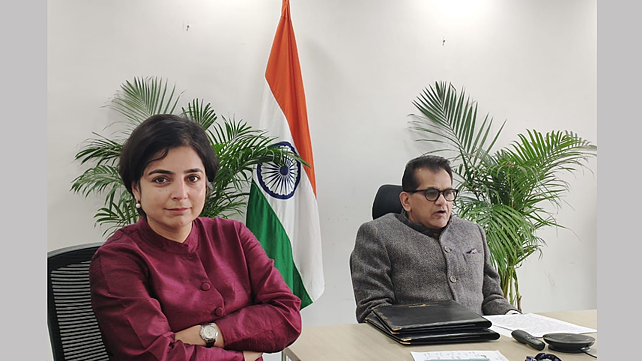
Convergence Energy Services (CESL), a wholly-owned subsidiary of Energy Efficiency Services (EESL), announced the floating of a request for proposals to procure electric buses for nine states under the Grand Challenge initiative.
Valued between INR 3,500 to INR 5,500 crore, this tender will aid in the procurement of around 5,450 buses, including 130 double-decker buses for the five states in the cities such as Bangalore, Delhi, Surat, Hyderabad, and Kolkata in the first phase. The remaining four states will be included at a later date.
The bidding terms and conditions have been standardised across states, and the bus manufacturers, including Tata, JBM, Ashok Leyland, Volvo Eicher, Olectra, and companies from South Korea, will get a 45-day window to bid for it. The plan is to launch the first electric bus by July 2022 and complete the tender by March 2024.
Mahua Acharya, MD and CEO, CESL, said that the Grand Challenge Tender represents the efforts of a large number of people, including STUs, OEMs, financiers, NITI Aayog, DHI, and CESL. This is the world's largest scheme and is built on a unique, asset-light model that allows STUs to implement economically and at scale.

'By reducing carbon emissions and air pollution, I am confident that this mandate will help India in successfully meeting climate change targets as defined by the Prime Minister, Narendra Modi. I would like to thank NITI Aayog for shepherding this whole initiative and WRI for their immense support. I would also like to extend my thanks to the STUs and the cities that will become part of this innovative initiative,' she added.
The Grand Challenge will certainly encourage the faster transition to green mobility across the country while creating a synergy between private operators and state governments. CESL is optimistic that this will further push its goal to attain transformation to EVs from fossil fuels in the coming years throughout the country and the world, she added.
Appreciating the efforts by STUs for participating in the challenge, Amitabh Kant, CEO, NITI Aayog, stated that India has undertaken several efforts, including an INR 10,000 budget outlay for the FAME-II scheme, that sees 35% of the funding allocated to the procurement of e-buses.
'The drive towards e-mobility should not be just through private mobility; the focus should be on moving people and not vehicles. This can only be done through public transportation,' Kant added.
The idea behind Grand Challenge is to converge and integrate the demand to reduce the prices of e-buses. Kant praised CESL for taking on the world's largest challenge, which is unusual because no one had standardised the tender to this extent before. This, he claims, will aid in meeting the COP26 target within the given timeframe of 2050.
Kailash Gahlot, Minister for Transport & Environment, Delhi, said, 'I am pleased to announce today that Delhi has requested 1,500 buses under the Grand Challenge and stands ready to offer state subsidies where they are required. We are aggressively pursuing electric mobility – and I commend CESL for its efforts to standardise the terms and conditions for how this is delivered.'
This apart, Hyderabad has evinced interest for 300 e-buses. Furthermore, West Bengal STU confirmed that the state has plans to install all of its depots with EV charging stations, which will be beneficial for public transport and private vehicle owners.
NB: Featured photo is representational; courtesy: JBM.